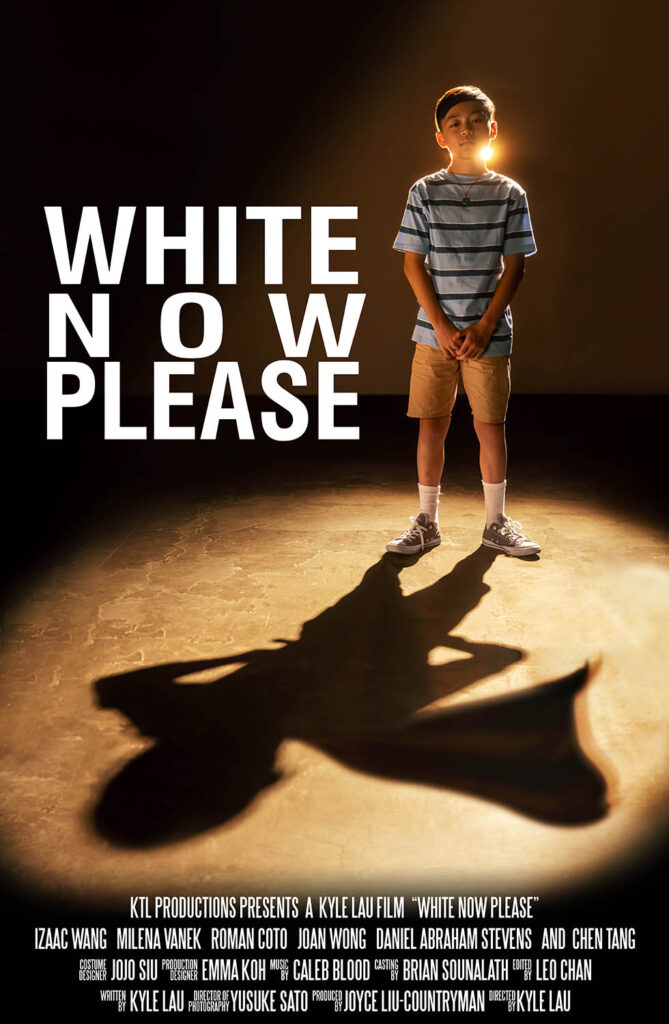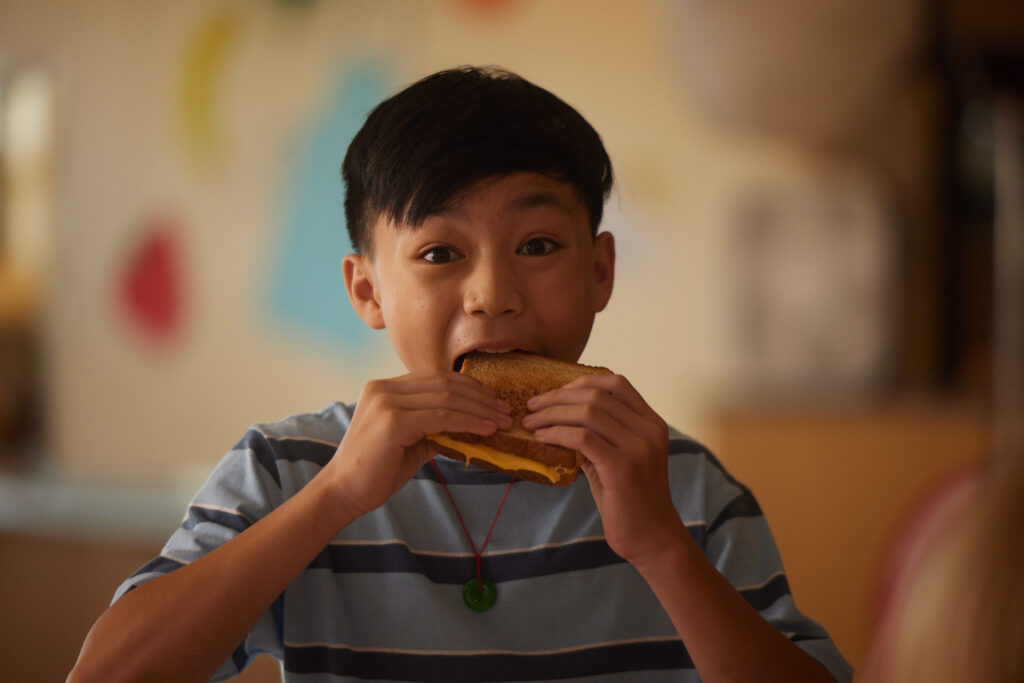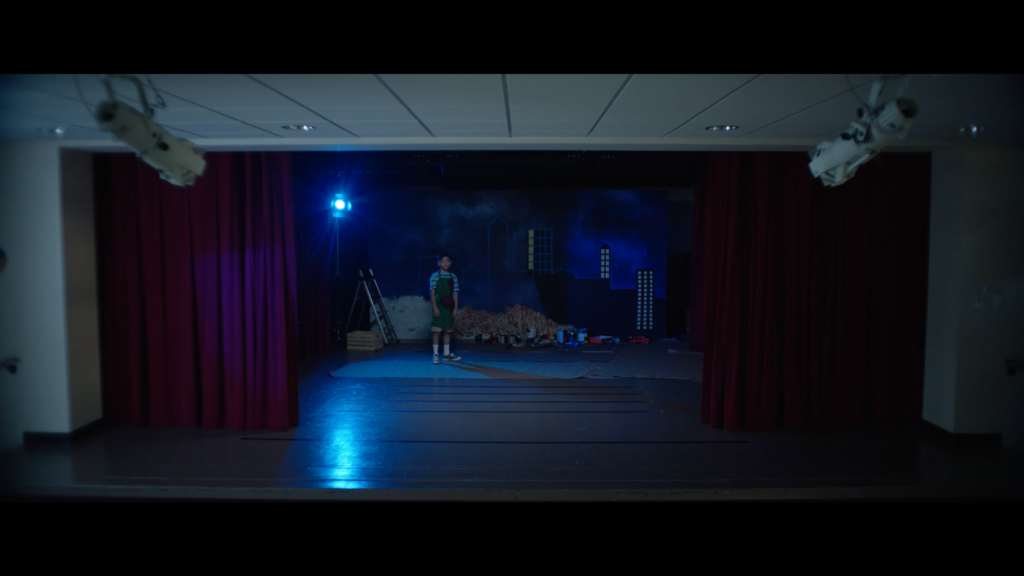Filmmaker Feature: Kyle Lau

Name: Kyle Lau
Discipline: Writer-Director-Producer
Film: White Now Please
Logline: Twelve-year-old Asian American Bryan Chen wants to be a hero, so he tries to become the thing he knows all heroes need to be… White.
Festival(s): Atlanta Comedy Film Festival
City you’re based in: Los Angeles, CA, USA
Short Bio: Kyle Lau is a writer/director originally from the Bay Area. He is the Co-Producer on AWKWAFINA IS NORA FROM QUEENS, where he was nominated for the WGA Award for Best Episodic Comedy for his penned episode on Season One. Previously, he worked as a Co-Producer on Lord/Miller’s CLONE HIGH (HBO Max), and a Staff Writer on ABC’s FRESH OFF THE BOAT. On the directing front, Kyle’s short film, WHITE NOW PLEASE, has won various festival-winning awards, including the Best Director Award at the 2022 Atlanta Comedy Film Festival.
Website: www.kylelau.com
Social Media Links: IG @kidklau
Favorite Quote: “Nothing is impossible.”
Interests/ Hobbies: Basketball, Golf, Eating, Food, Eating Food, and of course, eating food AT RESTAURANTS.

How did you get started in the Film Industry?
Honestly, it all started when my little brother and I were making silly home videos in the Bay. But then once I realized there truly was no one on screen that looked like me, and the only “yellow” character I saw was Pikachu, I knew change had to come. Most importantly, I wanted to help implement that revolution. So I came down to Los Angeles for college and stuck around ever since; shooting shorts and sketches with my friends, trying to find any way to get my foot in the door. It wasn’t until I was given a chance to intern at CAA and then work as a PA on FAMILY GUY (via my very-fortunate-to-have UCLA mentor(s)) was I able to get that shot!… (to make coffee and organize fridges, but then AFTER THAT… IT WAS ON!)
What are your upcoming and active projects?
Most upcoming, both AWKWAFINA IS NORA FROM QUEENS Season 3 and CLONE HIGH should be airing on their respective platforms at some point in 2023. After that, my team and I have an animated pilot entitled, FLOATERS, in development over at AMAZON, with Sony Pictures TV and the dope ass Asian-American Hip-Hop and R&B music label, 88 Rising.
What type of stories interest you and why?
Generally, I think I gravitate towards stories involving identity and anything that subverts expectations or makes some smart commentary on this crazy ass world we live in. I think I gravitate towards “identity” stories mainly because growing up not black or white, but somewhere in the middle, you find yourself really trying to find your “home” in the world that only sees black and white. I also like “subverting expectation” stories because on paper, growing up in the Bay as a son of a computer engineer, I should be an engineer in tech too, right? But nah, I’m a guy that makes money writing poop jokes.
What is your genre of choice?
Oh, this is a tough one. I like so many genres and tones, but if I had to put a unifier, I’d say all my projects are “comedy-forward.” Whether it gets dark and deals with murder or trauma, or whether it’s a light and punchy sitcom, all my projects lead with laughter because if we’re not bringing a MODICUM of joy in this world, what are we even doing?!
 Izaac Wang as Bryan. White Now Please
Izaac Wang as Bryan. White Now Please
How are you creating a path for yourself in this industry?
These are deep and thought-provoking questions that EMPOWER ME. YEAH! I AM a creating a path for myself! F YEAH! TRAILBLAZER KYLE! Haha. But on the real, I think, like everyone in this industry (and even not in this industry), I am constantly reworking and redefining my voice, my identity, and my “brand.” So I think I create a path for myself by looking within, finding what my truth is and how it can or why it SHOULD fit in the missing puzzle pieces of this industry as a whole. Or the other method I look at when creating paths is I usually tell myself: “Don’t do boring shit.” If it’s been seen or it’s been done, what’s next? What’s something YOU want to see on screen and how can you make this story something worthwhile that helps push the culture and art form forward? TL;DR – I like dope shit and only wanna create dope shit.
What inspires you as a storyteller?
Universal truths. There’s always a moment in any good story where, no matter what you look like or where you’re from, you FEEL that one moment because it’s REAL. Could be small like, “Today I feel like I officially outgrew a friend.” (i.e. BANSHEES OF INISHERIN) or could be something big like, “Love trumps all, even in a zombie apocalypse” (i.e. THE LAST OF US). Whatever that singular universal truth is that you’re finding, sharing, and establishing your opinion on… THAT is what keeps me going
How do you prep for a film, from writing to being on set?
There are a lot of different specifics between prepping for writing and production, but in general, I think a “universal truth” for both sectors is that I simply create a “plan.” As early as possible! With deadlines! YAY. DEADLINES. From “I need to get this Act 2 finished” during writing to “we need to know how we’re going to light this living room” in production – it all comes down to time management and setting yourself up for success but giving yourself ample amount of time to prepare and be able to execute the plan/vision on said day.
What is the first thing you do when you get a script?
Look at the page count, haha. Ain’t no one got time to read a shitty 120 pages. But on a serious note, I always try to read through a script the first time with minimal marking up and/or “notes.” I try to breeze through, as if you’re “watching it live time.” After that, I notate and try to pick up things depending on my role on the project. If it’s as a writer, it’s probably more story-related notes and thoughts and questions, with specific line changes and/or cuts or rearrangements. If it’s as a director, it’s probably more camera angle ideas or thematic motif call-outs, figuring out what the writers’ intention and purpose of this scene is, etc. — and how I can enhance that or bring that part to life.
What are a few lessons you’ve learned from your recent project(s)?
Open communication is key. It’s obviously easier said than done, but when things are going super fast – you want to be able to know the people you’re in the trenches with, you can trust. Have conversations beforehand about how you expect things to go, what you expect from them and more importantly, hear what they expect from you. Having all that figured out, in a non-combative, open and honest dialogue, makes the sprint that is production (especially for indie shorts) much, MUCH easier. Also, don’t be afraid to HAVE FUN during the process. Yes, it can be super stressful at times, but we are so fortunate to be able to create. Always remember that and whatever you’re doing or whenever you’re interacting with others (no matter your position), be the person that helps make the day just a tad more enjoyable and brighter. It will be appreciated by all.

White Now Please (movie still)
What practical tips do you have for indie filmmakers (budgeting, marketing, directing)?
Don’t leave any stone unturned. Expenses can add up extremely quickly in the indie game (especially with COVID costs – which I would make sure you have an additional 10-15% minimum added to the budget for COVID-related expenses), so discuss all options when budgeting and laying out your plan. Is this scene absolutely necessary in this location? Can your cousin’s brother’s friend give us a deal on that truck? What is the STORY POINT of this moment and how can we get that across in the most effective way possible? It also all starts with the script – so make sure that script (especially in the indie world, as months long re-shoots are not usually typical – this is your ONE SHOT!) is tight! Make sure everyone on the crew understands the themes/story points of each scene so everyone can do their job, working as one unified mind in their respective roles. As far as directing, I also like to say, “Don’t be afraid to discover new moments and things in the scene.” Yes, you’ve worked super hard on the script, but sometimes, with the collaboration of actors, production designers, etc. – you learn something new about this moment. So long as it works within the context of the story, your script — and specific lines or jokes or blocking patterns — CAN change live. And that’s alright! Again, HAVE FUN WITH IT. I believe the art and joy you have on set WILL come through camera as well!


0 Comments